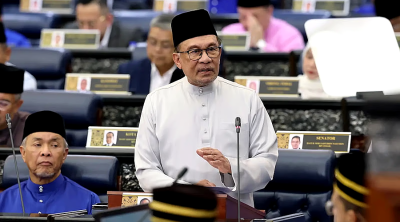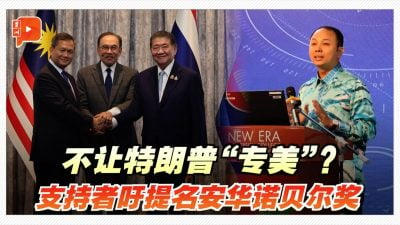
Anwar has stopped short of calling for any radical reform over his first 14 days as prime minister.
He was reported to have “reprimanded” Padiberas Nasional Bhd (Bernas) owner Syed Mokhtar Albukhary over the company’s monopoly on rice imports, rather than call for any end of such monopoly arrangements.
Anwar’s first cabinet is full of people valuable to him rather than those with any track record or ambitions for reform.
It appears as a “steady-as-she-goes” cabinet that will ensure more of the same.
However, calls for radical reforms are coming from an unexpected member of the government.
Deputy prime minister Ahmad Zahid Hamidi made some very significant comments about reform at a ceramah for the Padang Serai election.
Zahid said that race and religion are now obsolete, and the politics of inclusivity and unity are more relevant now than ever before.
Anwar is constrained within a political environment where being overt about reform could bring down the government or create a massive Malay backlash against the government, should they fear their special position is under threat.
Any calls to end monopolies would bring the establishment against him. This is an environment where those opposed to him both inside and outside the coalition would take advantage of.
When it comes to reform, there is no doubt about it, Anwar has to tread over “egg shells.”
However, the nation is in desperate need of social, economic, and market reforms. This is necessary not based upon any particular ideology but a need to push the momentum of the Malaysian economy and society forward, so that it can keep relative pace with the rest of the region.
The storm clouds of recession are just over the horizon!
From NEP to NEP-Plus
The NEP has shaped public policy for decades. Under the stewardship of Umno, policy has been framed within the affirmative action paradigm since the early 1970s.
Policies have been orientated towards providing “special privileges” towards the Malay middle-upper classes at the cost of the marginalized Malays, Indians, Chinese and other indigenous groups.
The marginalized can’t benefit from bumiputra discounts on luxury condominiums. The marginalized don’t have savings to invest in sovereign savings accounts like ASN and ASB. The marginalized have not benefited from education scholarships in the way the middle-upper classes have. The marginalized haven’t been given business contracts that Malay businesspeople with cabals have. The marginalized haven’t been given start-up grants like those “in the know” have.
This is where the NEP needs to be totally reframed. The NEP has to help those in need rather than those who don’t need.
It would be politically impossible to “kill off” the NEP. Those who felt entitled would push back, and Anwar’s government would face political resistance that would potentially bring the government down.
This is where cautious semantics are needed.
The NEP can only be reframed as the NEP-Plus. Policy initiatives must benefit those in need rather than those with greed.
This would mean policy initiatives focusing on marginalized bumiputras and other marginalized Malaysians as well.
The NEP-Plus would be a needs-based approach.
The NEP-Plus should have two components. The first component should be a safety net. This is urgently needed to help low-income families cope with the rapidly rising cost of living, so that more people won’t slip into relative poverty.
Both the Pakatan Harapan and Barisan Nasional had similar policy platforms on this matter. This is just about PH and BN meeting their campaign commitments.
The second aspect of the NEP-Plus should be focused upon capacity building.
Vocational education extension into the community, skills retraining, the promotion of micro-entrepreneurship start-ups and other initiatives like micro-finance availability to bring business credit facilities to those in real need.
The NEP-Plus must find solutions to drug dependency, youth idleness, the low proportion of male participation in higher education opportunities, and focusing on youth rural and urban unemployment.
The NEP-Plus should cease being a platform for enabling the expansion of crony capitalism. The costs of developing the Malaysian aerospace industry, benefiting a few well-connected businesses, should be weighed against new rural and urban entrepreneurship programs for the nation’s youth.
Let us hope that Anwar and Zahid’s campaign commitments will come true.
Zafrulnomics, focusing on bumiputra development to the exclusion of other groups in the 12th Malaysia Plan and two budgets he delivered, must be passed by very quickly.
This is why Anwar is personally holding the finance portfolio, moving Tengku Zafrul Aziz to MITI.
Unshackling the economy
Malaysia has always been pro-business. However, regulations and market restrictions have favored certain businesses.
Ordinary businesses are locked out from participating in particular markets where only those politically connected can benefit.
What more, these restrictions allow for bumper profits for monopolies and oligarchies, leading to high prices, while the economy is also running inefficiently.
Rent-seeking businesses are preferred over taking any risks with innovative start-ups. This can be seen in communications, banking and petrol franchises, just to name a few.
There is no level playing field with imports as special licenses or APs are required for the importation of many items. This favors sectional interests.
Finally, bumiputra equity requirements are flushing out industries like freight forwarding, forcing exoduses from markets by non-bumiputra parties.
Innovation is inhibited in Malaysia to the point where companies are moving offshore. Competition is stifled leading to poor levels of foreign investment and disincentives for local innovative start-ups.
Over-regulation, monopolies and oligopolies must be ended urgently. The Malaysian economy must be primed for innovation. Innovation cannot be driven from public enterprises and agencies.
The rice monopoly leaves consumers with poor choice of varieties and quality at high prices relative to the rest of the region. No one benefits except for the shareholders.
An economy many importers exist, and local producers could produce boutique rice varieties would benefit local producers, entrepreneurs and consumers.
Get the government out of business
Its time to rid the economy of government enterprises that compete with private companies.
Malaysia has a long list of government start-ups that have been financially disastrous and hotbeds of corruption.
The government must immediately clean out the inefficient and cash-draining GLCs that have been growing in exponential numbers over the last few decades. Let the private sector take up the opportunities.
GLCs are a hangover of developmental socialism. They started at a time when there were very few private enterprises around.
Today Malaysia is flourishing with over a million registered SMEs alone.
State biotechnology corporations did not create any local industry to speak of. The funds wasted on setting up GLCs would have been better spent on industry collaborative research.
It’s time to get GLCs out of the lives of Malaysians.
Malaysia is not Eastern Europe during the communist era. Malaysia is a mixed economy where private enterprises must be valued and promoted.
Civil servants should administrate, not act as entrepreneurs.
Equity, regulation and direct government intervention in the economy requires a total rethink if the economy is going to head towards the next level.
Equity rules must attract innovation, or else potential start-ups like Grab will just continue to run away to other countries.
There are signs that these reforms will be achievable under the new government administration. The mumblings are going in the right direction.
(Murray Hunter has been involved in Asia-Pacific business for the last 40 years as an entrepreneur, consultant, academic and researcher. He was an associate professor at Universiti Malaysia Perlis.)
ADVERTISEMENT
ADVERTISEMENT








































